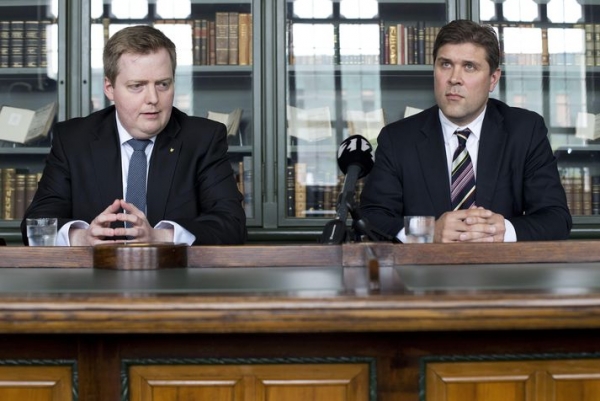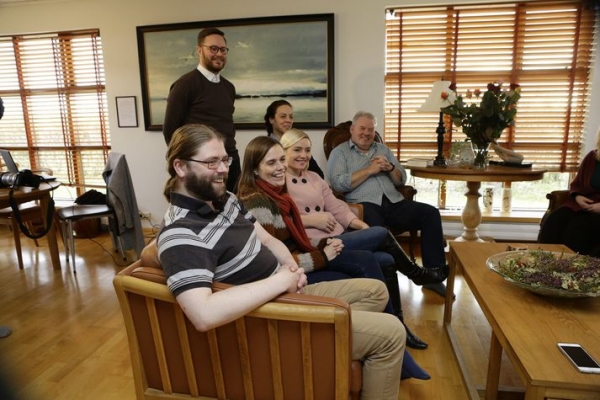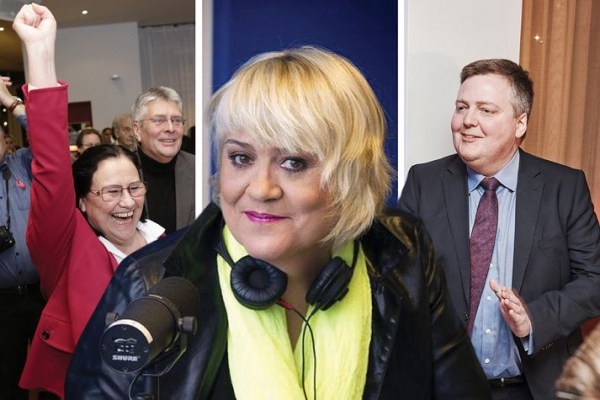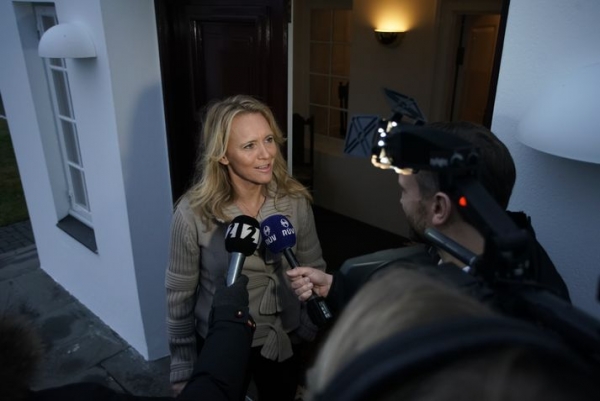The three left-wing parties and the centrist Progress Party continued their negotiations on the formation of a new coalition government today, after Katrín Jakobsdóttir, the chairman of the Left Green Movement was granted the formal mandate to commence negotiations by the President of Iceland, Guðni Th. Jóhannesson. Katrín has been cautiously optimistic in her remarks to journalists, stressing that all parties have to make compromises. No governing coalition will be able to solve all the world's problems and differences, she told media yesterday.
Read more: Breaking: Left Greens to lead negotiations on a center-left government
Center-left coalition led by Left Greens

The three left wing parties, the Left Greens, who are the second largest party in parliament with 11 MPs, the Social Democratic Alliance, who have 7 MPs and the Pirate Party, which has 4 MPs and the centrist Progress Party which has 8 MPs, hold a narrow 1 seat majority in the 63 seat parliament. The parties which were in opposition for the past year, began informal negotiations immediately following Saturday's elections.
Read more: Analysis: Populist parties, Talk Radio victorious in snap election
The ruling Progress Party led center-right coalition suffered a crushing defeat in the elections losing 12 MPs. While the opposition picked up 3 new MPs, the largest victories were won by two new populist parties which were backed by local talk radio station Útvarp Saga.
Under pressure to keep Panama-princes out of power

Katrín and the parties on the left have been under significant pressure from their voters to make every effort to ignore their differences to form a coalition government which would keep the conservative Independence Party and the populist Center Party out of government. The chairmen of the two parties have been dogged by repeated scandals and controversies.
A coalition government led by Signundur Davíð Gunnlaugsson, the chairman of the Center Party collapsed in 2016, following revalations in the Panama Papers leak that Sigmundur Davíð had sheltered assets in tax havens. A second coalition, led by Bjarni Benediktsson collapsed earlier this fall, in a scandal which has been dubbed Pardon-gate.
Negotiations at country estate

The local news site Vísir reports that the chairmen of the four parties are currently meeting at Syðra-Langholt, the country estate of the leader of the Progress Party, Sigurður Ingi Jóhannsson. Katrín, who leads the negotiations, has been careful to manage all leaks, trying to avoid the mistakes which were made during last year's negotiations when the left failed to reach an agreement with the centriest parties. Many blamed frequent leaks and lack of discipline in the negotiations for their failure.
Katrín told Vísir that she expects that the negotiations will proceed rapidly, and that she will have hammered out an agreement by early next week. She told reporters that the four parties would have to focus on the big picture, and that everyone would have make some compromise. The Left Greens, she said, will stress women's rights and action on global climate change.
Investment in physical and social infrastructure
The leaders of the other parties seconded Katrín's assessment that the negotiations will most likely proceed smoothly. Logi Einarsson, the chairman of the Social Democratic Alliance told the local newspaper Morgunblaðið that he was moderatley optimistic.
Judging by the statements of the party leaders to the National Broadcasting Service RÚV a center-left government would emphasize investment in physical and social infrastructure, everything from roads to health care and education. All the parties emphasized the need for such investments in their election campaigns. Sigurður Ingi talked of a Government of Rebuilding in an interview with Morgunblaðið:
We all agree that this if we manage to hammer out an agreement the coalition government will be a government of reconstruction, investment and rebuilding of those sectors we all agree are in dire need for investment.
A narrow majority shored up by populists and/or the liberal right

The four parties have 32 MPs combined, giving them a narrow 1 seat majority. Many supporters of the Left Greens and Progress Party had called for the extension of the coalition to include more parties. Many favored the populist People's Party which has 4 MPs, as it's emphasis on eradicating poverty enjoys significant support among many in the Left Green Movement
Party insiders have also told Iceland Insider that including the People's Party could help neutralize its tendencies for xenophbia and islamophobia. However, the party is split on this issue, as many heavyweights in the party believe past statements by MPs of the People's party disqualify the party as a potential coalition member.
The liberal Restoration, with its 4 MPs has also been named as a potential coalition member by many in the Left Greens and the Pirate Party. The leader of the Social Democratic Alliance was one of the main advocates of including Restoration in a broad coalition which would reach across the center to the liberal right.
A new and different kind of parliamentary opposition

According to reports Katrín explored the option of forming a broad coalition which would include all parties, except the Independence Party and Center Party out of power. At the end of the day, however, Katrín and her advisors came to the conclusion that such a broad coalition would be too unwieldy, and that it would be easier for the four parties who are currently negotiating to reach an agreement.
Katrín told RÚV that this did not mean the four parties would shut the People's Party or Restoration out, promising a more inclusive and cooperative style of government: The four parties would have to seek common ground with the People's Party and Restoration on important issues. Þorgerður Katrín Gunnarsdóttir, the chairman of Restoration told RÚV that her party would be willing to work with the incoming government, promising to operate a new and different kind of opposition in parliament.
The three left-wing parties and the centrist Progress Party continued their negotiations on the formation of a new coalition government today, after Katrín Jakobsdóttir, the chairman of the Left Green Movement was granted the formal mandate to commence negotiations by the President of Iceland, Guðni Th. Jóhannesson. Katrín has been cautiously optimistic in her remarks to journalists, stressing that all parties have to make compromises. No governing coalition will be able to solve all the world's problems and differences, she told media yesterday.
Read more: Breaking: Left Greens to lead negotiations on a center-left government
Center-left coalition led by Left Greens

The three left wing parties, the Left Greens, who are the second largest party in parliament with 11 MPs, the Social Democratic Alliance, who have 7 MPs and the Pirate Party, which has 4 MPs and the centrist Progress Party which has 8 MPs, hold a narrow 1 seat majority in the 63 seat parliament. The parties which were in opposition for the past year, began informal negotiations immediately following Saturday's elections.
Read more: Analysis: Populist parties, Talk Radio victorious in snap election
The ruling Progress Party led center-right coalition suffered a crushing defeat in the elections losing 12 MPs. While the opposition picked up 3 new MPs, the largest victories were won by two new populist parties which were backed by local talk radio station Útvarp Saga.
Under pressure to keep Panama-princes out of power

Katrín and the parties on the left have been under significant pressure from their voters to make every effort to ignore their differences to form a coalition government which would keep the conservative Independence Party and the populist Center Party out of government. The chairmen of the two parties have been dogged by repeated scandals and controversies.
A coalition government led by Signundur Davíð Gunnlaugsson, the chairman of the Center Party collapsed in 2016, following revalations in the Panama Papers leak that Sigmundur Davíð had sheltered assets in tax havens. A second coalition, led by Bjarni Benediktsson collapsed earlier this fall, in a scandal which has been dubbed Pardon-gate.
Negotiations at country estate

The local news site Vísir reports that the chairmen of the four parties are currently meeting at Syðra-Langholt, the country estate of the leader of the Progress Party, Sigurður Ingi Jóhannsson. Katrín, who leads the negotiations, has been careful to manage all leaks, trying to avoid the mistakes which were made during last year's negotiations when the left failed to reach an agreement with the centriest parties. Many blamed frequent leaks and lack of discipline in the negotiations for their failure.
Katrín told Vísir that she expects that the negotiations will proceed rapidly, and that she will have hammered out an agreement by early next week. She told reporters that the four parties would have to focus on the big picture, and that everyone would have make some compromise. The Left Greens, she said, will stress women's rights and action on global climate change.
Investment in physical and social infrastructure
The leaders of the other parties seconded Katrín's assessment that the negotiations will most likely proceed smoothly. Logi Einarsson, the chairman of the Social Democratic Alliance told the local newspaper Morgunblaðið that he was moderatley optimistic.
Judging by the statements of the party leaders to the National Broadcasting Service RÚV a center-left government would emphasize investment in physical and social infrastructure, everything from roads to health care and education. All the parties emphasized the need for such investments in their election campaigns. Sigurður Ingi talked of a Government of Rebuilding in an interview with Morgunblaðið:
We all agree that this if we manage to hammer out an agreement the coalition government will be a government of reconstruction, investment and rebuilding of those sectors we all agree are in dire need for investment.
A narrow majority shored up by populists and/or the liberal right

The four parties have 32 MPs combined, giving them a narrow 1 seat majority. Many supporters of the Left Greens and Progress Party had called for the extension of the coalition to include more parties. Many favored the populist People's Party which has 4 MPs, as it's emphasis on eradicating poverty enjoys significant support among many in the Left Green Movement
Party insiders have also told Iceland Insider that including the People's Party could help neutralize its tendencies for xenophbia and islamophobia. However, the party is split on this issue, as many heavyweights in the party believe past statements by MPs of the People's party disqualify the party as a potential coalition member.
The liberal Restoration, with its 4 MPs has also been named as a potential coalition member by many in the Left Greens and the Pirate Party. The leader of the Social Democratic Alliance was one of the main advocates of including Restoration in a broad coalition which would reach across the center to the liberal right.
A new and different kind of parliamentary opposition

According to reports Katrín explored the option of forming a broad coalition which would include all parties, except the Independence Party and Center Party out of power. At the end of the day, however, Katrín and her advisors came to the conclusion that such a broad coalition would be too unwieldy, and that it would be easier for the four parties who are currently negotiating to reach an agreement.
Katrín told RÚV that this did not mean the four parties would shut the People's Party or Restoration out, promising a more inclusive and cooperative style of government: The four parties would have to seek common ground with the People's Party and Restoration on important issues. Þorgerður Katrín Gunnarsdóttir, the chairman of Restoration told RÚV that her party would be willing to work with the incoming government, promising to operate a new and different kind of opposition in parliament.






